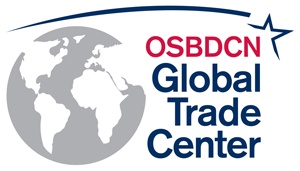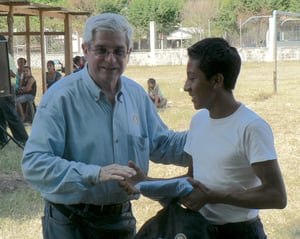
Updated March 2023
Warren Banks has been with the PCC Small Business Development Center for twelve years. He currently works as a co-facilitator and advisor for the Buying and Selling Outside the U.S. training program. Over the years, he's helped hundreds of small businesses across Oregon take advantage of the global marketplace. Today, he shares his journey and knowledge with us.
Warren, tell us why you love teach & advise? I love to learn about companies and help them get to where they want to be. In general, I’m one of those people who want to help others--I think most people are. By helping others, I feel that I am paying it forward. When I help out these business owners and employees, I get to share some of the many resources I’ve found over the years.
The next Buying and Selling Outside the U.S. training program starts
October 12, 2023 -- LEARN MORE
What kind of international experience do you have? Most of my career I have been involved with international work. I started out working in banking in Japan helping companies with trade finance. I have been in Oregon since 1982, mostly involved in international trade. I managed the Trade Division for the state of Oregon (now Business Oregon Global Connections) from the late 90s into the early 2000s. I’ve met a lot of people and discovered a lot of great resources. I can direct clients to the right person or agency to help meet their needs, whether it’s an association in their field, a US trade specialist, local consulate office, or whatever.
What is your favorite part about being an instructor and advisor? I love it when I refer a client to someone or make a suggestion about how they should proceed, and then they come back and say, “Thanks to you I’m now doing business in that market!”
What kinds of businesses do you work with? Most of the people I work with are pretty small companies--a single owner with 1 to 5 employees. They are able to find a niche and run with it. They do well in the domestic market and see an opportunity to expand globally. For instance, a couple of years ago we worked with the owner of a small food manufacturing business here in Portland. At the time it was a one-person operation. Then sales grew and she was able to hire more employees. She was getting inquiries from potential international customers. She was able to meet some folks at a trade/buyers event in Florida, and now she is selling into both Canada and Japan, among other places.
 What is necessary for someone to achieve success in international business? Businesses shouldn’t get distracted by unsolicited inquiries. They should figure out how to expand in the US. first, and then worry about taking on international expansion. It can be easy to get distracted. The ones that do the best are the ones that have strong domestic sales. The more profitable the better. Then they can afford to invest the time and money it takes to go international.
What is necessary for someone to achieve success in international business? Businesses shouldn’t get distracted by unsolicited inquiries. They should figure out how to expand in the US. first, and then worry about taking on international expansion. It can be easy to get distracted. The ones that do the best are the ones that have strong domestic sales. The more profitable the better. Then they can afford to invest the time and money it takes to go international.
You can’t really do it long distance, either. If you want to sell into another country you have got to go there. If you can’t afford to go there you probably should wait. Of course, you can get grants from the state that match what you put in (up to a certain amount) that will help you go to a trade show. That will help to increase your leverage.
People are surprised at how little it can take to expand internationally. It does take time and money, but on the cheap side a business could get into it for an investment of $10,000 to $20,000.
What are some of the typical struggles your clients have in regards to international trade? Dealing with customs in a foreign country can be a challenge if you don’t know what you are doing. We walk people through the different aspects of shipping, working with a customs broker and freight forwarder, that sort of thing. It’s very different than domestic sales.
One of the most frustrating mistakes a company can make is that they decide to ship something to somebody they don’t know who sent them an inquiry by email. They haven’t done the homework on what it takes to get through customs on the other end, but ship the product anyway. Then their products sit on the dock in a foreign country because the products can’t clear customs.
 What kinds of clients/students do you teach in the Buying and Selling Outside the U.S. training program? Typically there are two kinds of businesses that take the program:
What kinds of clients/students do you teach in the Buying and Selling Outside the U.S. training program? Typically there are two kinds of businesses that take the program:
1) They have strong sales and are expanding in the domestic market. They become aware of an opportunity to expand into the international markets and want to know what that will take. They are taking the class to be ready when the time comes. They want to have a basis of knowledge upon which to draw when the time is right.
2) We also get clients who are already exporting (or importing) and have just sort of been doing so by the seat of their pants. They feel the need to optimize their procedures so they aren’t always playing catch up. This group usually says something like, “I’ve made some big mistakes. How do I get out of them?” Of course, we help them the best we can but it usually takes some time and effort. It’s best not to make the mistakes in the first place.
If you could give one piece of advice to all your future students, what would it be? I want them to be aware of the potential dangers. If they don’t know what they are doing they can make some costly mistakes. For instance, they could unknowingly violate federal compliance regulations which typically leads to a hefty fine for not doing things the right way.
Or a company might not be clear on how to quote pricing and may forget to take into account all of the expenses (currency exchange, shipping, etc). If that happens, the project that looked profitable might actually end up costing money in the long run.
Another issue can be labelling requirement for the country to which they are exporting. For instance, in Canada your label needs to be in both English and French. Other countries may require you to label in milliliters vs. ounces.
Of course, our clients seldom have these problems, because in class we cover all of this, so they know all of the things they have to look into and be aware of. We also tell them where to go and who to talk to in order to find the answers.
What do you do for fun? I can’t ski any more (I have a bum left knee), so I spend a lot of time doing Rotary service work. We just spent 12 days in Costa Rica and Guatemala doing service work. We go once a year or so and have some great friends down there we are happy to get to see.
 What kind of projects were you doing in Costa Rica and Guatemala? This time we were reviewing a stove project, so people can have a stove to cook on indoors rather than cooking over a fire pit and inhaling the smoke. We also did some work with a clean water project, and provided scholarships for junior high schoolers. In Costa Rica we worked on a peace project to try and help end some of the conflicts going on at the border.
What kind of projects were you doing in Costa Rica and Guatemala? This time we were reviewing a stove project, so people can have a stove to cook on indoors rather than cooking over a fire pit and inhaling the smoke. We also did some work with a clean water project, and provided scholarships for junior high schoolers. In Costa Rica we worked on a peace project to try and help end some of the conflicts going on at the border.

